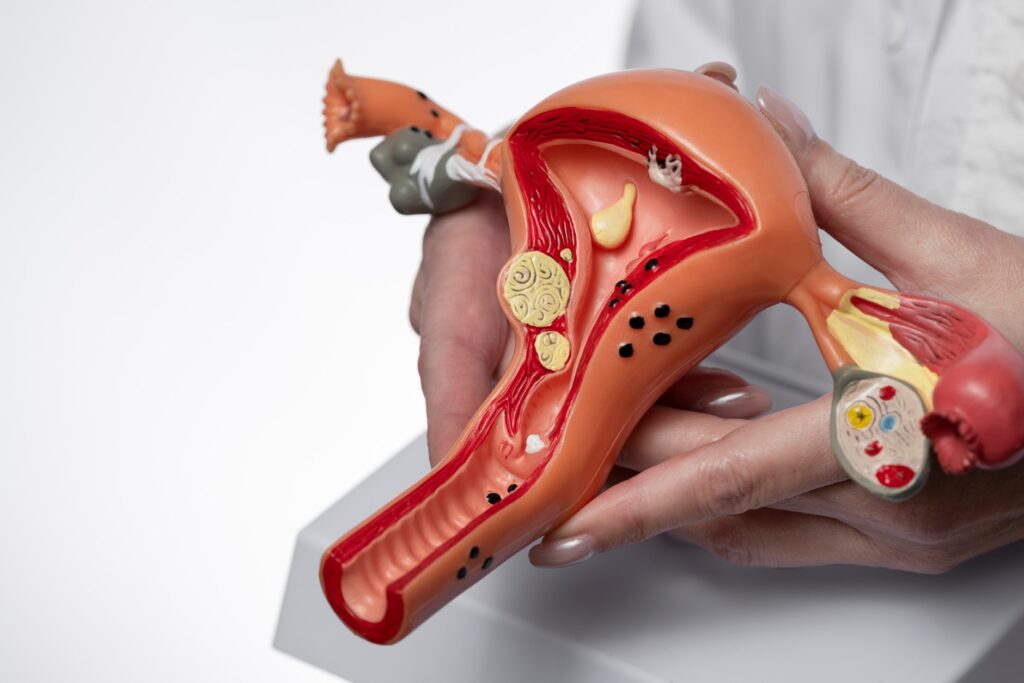What is Endometriosis?
Endometriosis is a health condition where tissue similar to the lining inside the uterus grows outside it. This tissue can cause pain, swelling, and other problems. Often, endometriosis affects the ovaries, fallopian tubes, and the tissue lining the pelvis. However, it can sometimes spread beyond these areas. According to the World Health Organization (WHO), endometriosis affects about 10% of women of reproductive age worldwide. Because the tissue acts like normal uterine lining, it thickens and bleeds during each period. But, unlike normal tissue, it cannot leave the body easily. As a result, this can lead to pain and scar tissue.
Common Symptoms
Many people with endometriosis experience a range of symptoms. However, some may have no symptoms at all. Early detection can help manage the condition better. Common signs include:Painful periods (dysmenorrhea)Pain during or after sexHeavy menstrual bleedingPain with bowel movements or urination, especially during periodsFatigueInfertility or trouble getting pregnantLower back and pelvic pain
Because these symptoms can overlap with other conditions, it is important to talk to a doctor if you notice them.
Causes and Risk Factors
Doctors do not know the exact cause of endometriosis. Still, several factors may increase your risk. For example, genetics can play a role. If your mother or sister has endometriosis, you may be more likely to develop it. Other possible causes and risk factors include:Retrograde menstruation (when menstrual blood flows backward into the pelvis)Immune system problemsHormone levels, especially estrogenStarting periods at an early ageShort menstrual cycles (less than 27 days)Never giving birthLow body mass index (BMI)
Because endometriosis can run in families, it is helpful to know your family history.
How Endometriosis is Diagnosed
Doctors use several steps to diagnose endometriosis. First, they ask about your symptoms and medical history. Then, they may do a pelvic exam to feel for cysts or scars. However, small areas of endometriosis are hard to detect this way. To get a clearer picture, doctors may use imaging tests, such as:UltrasoundMagnetic Resonance Imaging (MRI)
Sometimes, a minor surgery called laparoscopy is needed. During this procedure, a doctor looks inside your abdomen with a small camera. This is the only way to confirm endometriosis for sure. Early diagnosis can help you manage symptoms better.
Treatment Options
Treatment for endometriosis depends on your symptoms and plans for pregnancy. While there is no cure, many options can help you feel better. Common treatments include:Pain relievers, such as ibuprofenHormone therapy to slow tissue growthBirth control pills or patchesGonadotropin-releasing hormone (GnRH) agonistsProgestin therapySurgery to remove endometriosis tissue
For severe cases, doctors may suggest surgery. However, many people find relief with medicine and lifestyle changes. Always talk to your doctor before starting any treatment.
Lifestyle Tips and Self-Care
Living with endometriosis can be challenging. However, some lifestyle changes may help manage symptoms. For example, you can try:Regular exercise to reduce pain and stressEating a balanced diet rich in fruits and vegetablesUsing heat pads for crampsPracticing relaxation techniques, such as yoga or meditationGetting enough sleep each night
Because everyone is different, you may need to try several strategies to find what works best for you.
Prevention and Early Detection
Currently, there is no sure way to prevent endometriosis. However, early detection can help reduce problems. For instance, paying attention to changes in your periods or pain levels is important. If you notice new or worsening symptoms, see your doctor soon. Early treatment can help control pain and protect your fertility.
When to See a Doctor
If you have ongoing pelvic pain, heavy periods, or trouble getting pregnant, it is time to talk to a healthcare provider. Even if your symptoms seem mild, early advice can make a big difference. Remember, only a doctor can diagnose and recommend the right treatment for endometriosis.
For personalized advice on endometriosis, consult us at Lotus Hospitals today.

